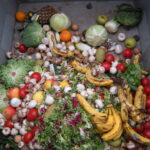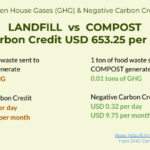Transforming Food Waste into Gold: The Role of Composting in Malaysia’s Sustainable Future
The Challenge of Food Waste in Malaysia
 In the lush landscapes of Malaysia, where culinary diversity flourishes, the issue of food waste has gained prominence. With a growing population and rapid urbanization, the need for sustainable waste management practices, particularly in handling food waste, has become crucial. Composting emerges as a practical and eco-friendly solution, offering numerous environmental and economic benefits for a developing country like Malaysia.
In the lush landscapes of Malaysia, where culinary diversity flourishes, the issue of food waste has gained prominence. With a growing population and rapid urbanization, the need for sustainable waste management practices, particularly in handling food waste, has become crucial. Composting emerges as a practical and eco-friendly solution, offering numerous environmental and economic benefits for a developing country like Malaysia.
Malaysia faces a significant challenge in managing its escalating food waste. Rapid urbanization, changing lifestyles, and increased consumption patterns contribute to this challenge. According to recent studies, Malaysia generates millions of tons of food waste annually, exacerbating environmental issues such as greenhouse gas emissions and landfill pressure.
The Environmental Impact
Food waste in landfills produces methane, a potent greenhouse gas that contributes to climate change. Composting, on the other hand, provides a sustainable alternative by converting organic waste into nutrient-rich compost. This process not only reduces methane emissions but also mitigates the environmental impact associated with conventional waste disposal methods.
Community Engagement and Education
Implementing food waste composting initiatives requires community engagement and education. Raising awareness about the benefits of composting and providing simple guidelines for households, businesses, and communities can encourage widespread adoption of this sustainable practice. Educational campaigns can highlight the positive impact of composting on soil health, reducing the need for chemical fertilizers.
Localizing Composting Practices
Tailoring composting practices to local conditions is crucial for success. Malaysia’s diverse climate and cultural practices necessitate adaptable composting methods. Community-based composting initiatives can be established, promoting decentralized solutions that empower local communities to manage their organic waste effectively.
Economic Opportunities
Composting not only addresses environmental concerns but also unlocks economic opportunities. The resulting compost can be used as an organic fertilizer, contributing to sustainable agriculture practices. Small-scale entrepreneurs can emerge as compost suppliers, creating jobs and fostering economic growth at the grassroots level.
Government Support and Policy Implementation
Government support and policy frameworks play a pivotal role in promoting food waste composting. Incentives, subsidies, and regulatory measures can encourage businesses and households to adopt composting practices. Collaborative efforts between the government, NGOs, and private sectors can drive the development of a comprehensive waste management infrastructure.
Challenges and Solutions
Despite its many benefits, food waste composting faces challenges such as limited awareness, infrastructure gaps, and the need for behavioral change. Solutions involve continuous education, investment in composting facilities, and partnerships between government bodies, businesses, and communities.
Conclusion
Food waste composting stands as a beacon of sustainability for Malaysia, offering a transformative solution to the challenges posed by escalating organic waste. By embracing composting practices, Malaysia can pave the way for a greener and more sustainable future, simultaneously addressing environmental concerns and fostering economic growth at the grassroots level.


